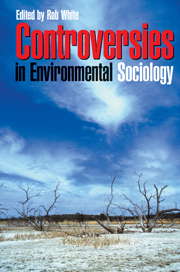Book contents
- Frontmatter
- Contents
- Tables and Figures
- Author Notes
- Abbreviations
- Introduction: Sociology, Society and the Environment
- PART I SOCIAL PERSPECTIVES
- 1 Old Traditions and New Ages: Religions and Environments
- 2 Social Nature
- 3 Gender, Eco-Feminism and the Environment
- 4 Animals, ‘Nature’ and Human Interests
- 5 Governing Environmental Harms in a Risk Society
- PART II SOCIAL TRENDS
- PART III SOCIAL ISSUES
- Index
- References
4 - Animals, ‘Nature’ and Human Interests
Published online by Cambridge University Press: 05 June 2012
- Frontmatter
- Contents
- Tables and Figures
- Author Notes
- Abbreviations
- Introduction: Sociology, Society and the Environment
- PART I SOCIAL PERSPECTIVES
- 1 Old Traditions and New Ages: Religions and Environments
- 2 Social Nature
- 3 Gender, Eco-Feminism and the Environment
- 4 Animals, ‘Nature’ and Human Interests
- 5 Governing Environmental Harms in a Risk Society
- PART II SOCIAL TRENDS
- PART III SOCIAL ISSUES
- Index
- References
Summary
The emergence of environmental sociology in recent decades has legitimated the study of nature–society relations within the discipline of sociology. However, within environmental sociology itself, the nature/society couplet has been defined in quite narrow terms, excluding for the most part our relations with non-human animals.
The key debates in this chapter are suggested in the title ‘Animals, “Nature” and Human Interests’, where each of the three concepts are problematised in various ways. Animal rights supporters argue that there are two kinds of animals – human and non-human – and that both have rights and interests as sentient beings; they believe, however, that the dominant ideology of ‘speciesism’ enables humans to exploit non-human animals as commodities to be eaten, displayed, hunted and dissected for their benefit. Environmentalists believe that nature (as in the natural world) needs to be distinguished from ‘nature’ or the Umwelt (a German word which literally means the world around us); this ‘nature’ is the constructed nature of gardens, zoos, aquariums, natural history museums and so on. And finally, the term ‘human interests’ signals the possibility of conflicts of interest between different humans (e.g. environmentalists and factory farmers, vivisectionists and animal liberationists, hunters and ‘hunt saboteurs’) as well as the notion of human interests versus the interests of non-human animals (e.g. our desire to see megafauna in zoos versus the captive animal's desire to run wild, or our taste for meat versus the suffering of individual animals in slaughterhouses or in the live animal export trade).
- Type
- Chapter
- Information
- Controversies in Environmental Sociology , pp. 61 - 76Publisher: Cambridge University PressPrint publication year: 2004
References
- 1
- Cited by



